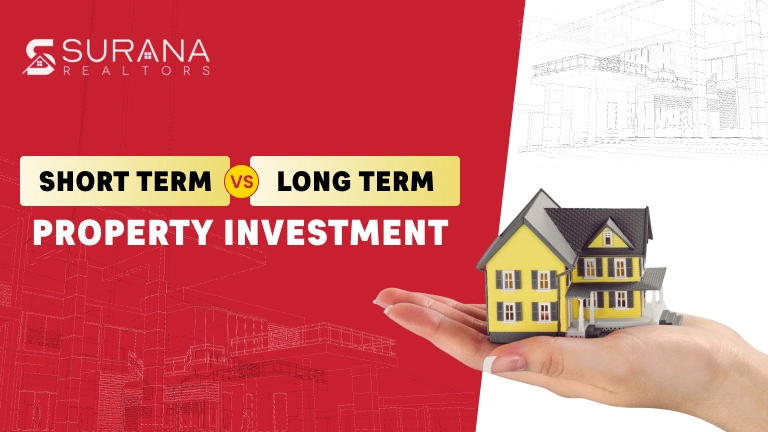Real estate remains one of the most powerful ways to build wealth and achieve financial stability. However, not all investments in property are created equal. Some investors look for quick profits, while others prefer stable, long-term returns. That’s where the concepts of short-term and long-term property investment come into play.
This blog will dive into short-term investment vs long-term investment, breaking down both strategies, providing examples, and helping you understand which might be the better fit for your financial goals.
What Is Short-Term Property Investment?
Short-term property investment refers to buying real estate with the intention of selling or monetizing it within a relatively brief time frame, typically less than three years. These investments are often aimed at generating quick profits through appreciation, flipping, or short-term rentals.
Examples and Options for Short-Term Property Investment
Here are a few examples of short-term real estate investments:
Fix-and-Flip Properties: Buying a distressed property, renovating it, and reselling it quickly for a profit.
Vacation Rentals/Airbnb: Investing in properties that can generate income through short-term stays.
Pre-Launch Bookings: Buying under-construction properties at lower rates and selling them when prices appreciate.
Auction Property Deals: Purchasing undervalued properties at auctions and reselling them quickly.
Benefits of Short-Term Property Investment
Now that you are familiar with long-term property investment options, it’s time to understand their benefits:
Quick Returns: Short-term investments can yield profits within months.
Flexibility: You’re not tied down to a single property for years.
Lower Market Dependency: Quicker turnaround helps you avoid long-term market risks.
Opportunistic Investing: Great for capitalizing on sudden market dips or hot opportunities.
Risks Associated with Short-Term Property Investment
The following are the risks of short-term property investment:
Market Volatility: A sudden downturn could reduce profit margins or make resale difficult.
High Transaction Costs: Costs like taxes, agent fees, and renovations can eat into profits.
Legal and Regulatory Issues: Vacation rentals and short-term lets can be subject to local restrictions.
Time-Intensive: Finding, renovating, and selling requires constant attention.
Managing Short-Term Properties
Managing short-term investments involves active engagement. This includes:
- Regularly monitoring the market
- Hiring property managers or renovation teams
- Staying updated on local property laws
- Marketing the property effectively (especially for rentals)
What Is Long-Term Property Investment?
Long-term real estate investment involves holding onto a property for several years, often five years or more. The focus here is usually on stable rental income, capital appreciation over time, or even using the property as a retirement asset.
Examples and Options of Long-Term Real Estate Investment
Let’s take a look at some examples of long-term property investments:
Rental Homes/Apartments: Properties leased to tenants for monthly income.
Commercial Real Estate: Office spaces, retail outlets, or warehouses leased on long-term contracts.
Buy-and-Hold Properties: Residential properties purchased and held for 5-20 years.
Land Investment: Purchasing land in developing areas for future resale or construction.
Benefits of Long-Term Property Investment
Here are the key benefits of long-term property investment:
Stable Income: Monthly rental income creates predictable cash flow.
Capital Appreciation: Property value typically rises over time.
Tax Benefits: Long-term investors may enjoy deductions on mortgage interest, depreciation, and maintenance.
Less Stress: Fewer decisions and less active management once tenants are in place.
Risks Associated with Long-Term Property Investment
The following are the risks of long-term real estate investment:
Illiquidity: Selling a property can take time, especially in a slow market.
Maintenance Costs: Long-term ownership comes with repair, upkeep, and tenant-related expenses.
Regulatory Risks: Rental regulations or property taxes can change.
Market Cycles: You may experience periods of low appreciation or declining values.
Managing Long-Term Property Investment
Effective management strategies include:
- Conducting background checks on tenants
- Using property management services
- Regular property inspections
- Budgeting for annual maintenance
- Staying compliant with tax and rental laws
Difference Between Short-Term and Long-Term Property Investment
Here is a detailed comparison between short-term vs long-term property investment:
| Feature | Short-Term Investment | Long-Term Investment |
| Investment Duration | Less than 3 years | 5+ years |
| Income Type | Quick profits/resale | Regular rental income |
| Risk | High due to market fluctuations | Moderate but long-term exposure |
| Effort Required | High (active management) | Medium (passive once leased) |
| Returns | Potentially high, quick | Steady and compounding |
| Tax Implications | Higher short-term capital gains | Potential tax benefits |
| Liquidity | High if market is good | Lower liquidity |
| Ideal For | Flippers, opportunists | Passive investors, retirees |
Which Is Better: Short-Term or Long-Term Property Investment?
There is no one-size-fits-all answer. The right choice of real estate investment depends on your goals, risk appetite, and available capital:
- Choose short-term if you want fast profits, are market-savvy, and have time to manage projects actively.
- Opt for the long-term if you prefer stability, passive income, and wealth accumulation over time.
- Many seasoned investors actually maintain a mix of both strategies to balance risk and optimize returns.
Also Read – Plot vs House: Which Should You Buy for Better Investment in 2025?
Conclusion
Both short-term and long-term property investments have their own merits and challenges. If you’re looking for a fast-paced, hands-on approach with quicker returns, short-term may suit you better. On the other hand, if you value stability, steady cash flow, and long-term appreciation, then long-term investing is the way to go.
Understanding your financial goals and risk tolerance is key. Whether you’re just starting out or looking to diversify your portfolio, real estate remains a rewarding avenue—when approached with the right strategy.
Still undecided? Start small, experiment with both, and learn what suits your investment personality best!

